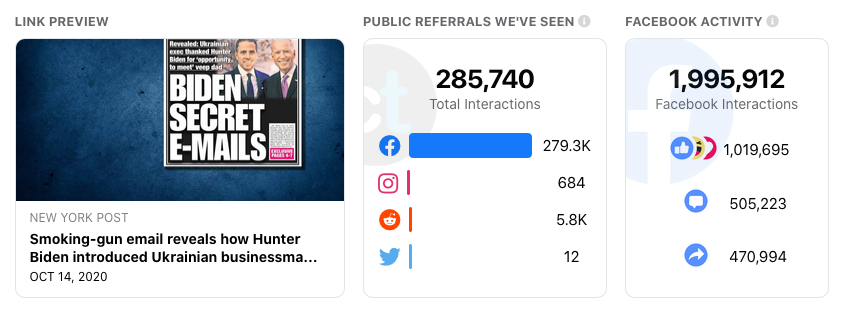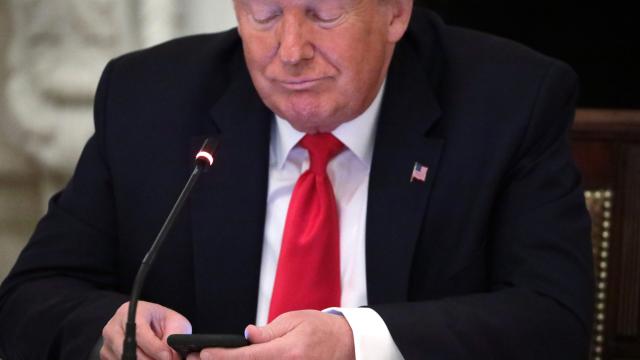This week, U.S. Republicans got their most coveted pre-election prize: smoking-gun evidence that Facebook and Twitter are depriving them of their God-given right to say whatever they want on Facebook and Twitter, as the Founding Fathers intended. It’s the moment they’ve all been waiting for. They could not be more outraged. Except, based on Facebook’s own metrics, that company hasn’t censored them at all.
If you’ve missed this, on Wednesday, the New York Post published a piece titled “Smoking-gun email reveals how Hunter Biden introduced Ukrainian businessman to VP dad.” The email in question was supposedly obtained from Hunter Biden’s hard drive, copied by a computer repairman with an inconsistent story, and handed over to Rudy Giuliani’s lawyer.
All but discrediting the sourcing, the Washington Post reported that U.S. intelligence agencies have long concluded that Rudy Giuliani has been targeted by Russian agents to spread propaganda. According to a former intelligence official who spoke with the Post, national security adviser Robert O’Brien directly warned U.S. President Trump that he should assume that Russia had manipulated any information Giuliani obtained from Ukraine. (“That’s Rudy,” Trump reportedly responded.) Giuliani has also admitted to, and been investigated for, trying to get damaging information on Joe and Hunter Biden related to Ukraine. The New York Post nonetheless seems to be planning a slow drip of stories from the sketchy trove.
A search on Facebook’s content discovery platform CrowdTangle shows that as of early Friday afternoon, the New York Post story has been shared over 470,000 times and has nearly 2 million interactions. Comparably, a New York Times article about Facebook and Twitter’s actions, also published Wednesday, has been shared on Facebook only 1,339 times. And a New York Post story, also published Wednesday, on the Amy Coney Barrett confirmation hearings, has been shared 46 times, as of this writing.

The New York Post’s original Facebook post stands without a fact-check label, as do links by the Trump campaign and numerous Republican lawmakers.
Gizmodo has asked Facebook how far the story might have otherwise spread, had they not taken action. We will update if we hear back.
Twitter, on the other hand, completely blocked users from sharing the story’s URL, and that of a subsequent New York Post story; Twitter explained in a thread that they violated Twitter’s rules by sharing images with personal and private information (the Post didn’t blur email addresses or a phone number), and that the content of the stories violated their “hacked materials” policy. That policy, enacted in 2018 — announced as part of an election integrity initiative, recalling the 2016 Hillary Clinton email leaks — stated that “news articles discussing a hack,” without including the hacked materials, are exempt from penalties. Twitter even briefly locked the account for White House press secretary Kayleigh McEnany for sharing a link to the initial Post article. McEnany claimed that the company would only reinstate her account if she deleted a tweet linking to the story. (Twitter did not immediately respond to Gizmodo’s request for confirmation.)
When asked by Protocol to elaborate, Andy Stone sent a link to Facebook’s viral misinformation policy, which states that “if we have signals that a piece of content is false, we temporarily reduce its distribution pending review by a third-party fact-checker.”
U.S. Senator Josh Hawley, a Missouri Republican, has called on Facebook’s Mark Zuckerberg and Twitter CEO Jack Dorsey to testify before the U.S. Senate Committee on the Judiciary Subcommittee on Crime and Terrorism over supposed election interference. After announcing a Senate Judiciary Committee vote to subpoena Dorsey, Texas Senator Ted Cruz demanded to know “what the hell is going on.” FCC Republican Chairman Ajit Pai has announced plans to tweak one of the foundational rules of the internet, likely to restrict moderation: a topline item on the GOP wishlist.
By Thursday, Twitter backpedalled and announced that it would allow similar content to be shared with a label clarifying the source of the information. Dorsey apologised on Friday morning for blocking the URL, subtweeting the announcement that Twitter is changing its hacked material policy to allow for third-party sources to share it with a label providing context, while blocking tweets sharing stolen material from hackers themselves.
The problem is that Twitter’s policy update only makes sense in the context of a news story shared by a media outlet. There’s no way Twitter can consistently determine whether an individual Twitter user was involved in a hack. Twitter will still prevent users from sharing “private information, synthetic and manipulated media, and non-consensual nudity.” Gizmodo has reached out to Twitter for more information on what the contextual labels will look like and will update the post if we hear back
Given the objectively widespread reach of the Post article on its platform, why did Facebook even bother making an announcement that’s 1) totally antithetical to Facebook’s generally hands-off approach to conservative-leaning media and 2) not enough to appease anybody who feels that Facebook should scrutinise any dubiously-reported “scandal” just before the U.S. election?
Meanwhile, White House press secretary Kayleigh McEnany is back and now tweeting that “TWITTER” is her enemy, along with the “DEEP STATE.”
